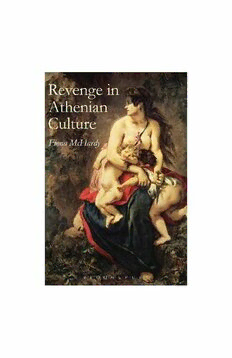
Revenge in Athenian Culture PDF
Preview Revenge in Athenian Culture
Revenge in Athenian Culture This page intentionally left blank Revenge in Athenian Culture Fiona McHardy BLOOMS BURY LONDON • KEW DELHI • :--IEW YORK • SYDNEY Bloomsbury Academic An imprint of Bloomsbury Publishing Plc 50 Bedford Square 1385 Broadway London New York WClB 3DP NY 10018 UK USA www.bloomsbury.com First published in 2008 by Gerald Duckworth & Co. Ltd. Reprinted by Bloomsbury Academic 2013 © Fiona McHardy 2008 Fiona McHardy has asserted her right under the Copyright, Designs and Patents Act, 1988, to be identified as Authors of this work. All rights reserved. No part of this publication may be reproduced or transmitted in any form or by any means, electronic or mechanical, including photocopying, recording, or any information storage or retrieval system, without prior permission in writing from the publishers. No responsibility for loss caused to any individual or organization acting on or refraining from action as a result of the material in this publication can be accepted by Bloomsbury or the author. British Library Cataloguing-in-Publication Data A catalogue record for this book is available from the British Library. ISBN: HB: 978-0-7156-3569-8 E-pub: 978-1-4725-0254-4 E-pdf: 978-1-4725-0253-7 Library of Congress Cataloging-in-Publication Data A catalog record for this book is available from the Library of Congress. Contents Acknowledgements Vil Introduction 1 What constitutes revenge? 2 Why take revenge? 6 1. A Life for a Life 9 Achieving a balance 9 Kin-help 11 Responses to homicide 15 Battlefield revenge 25 'Women do most delight in revenge' 37 An eye for an eye 43 2. Adultery, Rape and Seduction 45 The protection of women 45 Responses to sexual offences against women 50 Wars over women 58 Medea's sexual proprietariness 61 3. Raiding, Theft and Property Disputes 65 The protection of property 65 Cattle-raiding 67 Property disputes in classical Athens 75 The significance of weaponry and armour 79 Ajax and the perverted cattle-raid 82 4. Insults, Status and Power 85 Responses to insults and the protection of honour 85 Insults, honour and status in the Athenian law courts 94 Insults and power disputes in the Theban plays 100 5. What Motivates Orestes? 103 The Oresteia story in Homer and tragedy 104 Parallels to the Oresteia story 112 V Revenge in Athenian Culture Concluding Remarks: Patterns of Revenge 119 Notes 121 Bibliography 151 Index Locorum 165 General Index 173 Vl Acknowledgements This book has been many years in the making and I would like to thank all those who have taken the time to discuss revenge with me and commented on papers I have given on the subject. I would particularly like to thank Richard Seaford for his support and encouragement over the years and for his helpful comments and advice. Tom Harrison, Helen King and Charlotte Behr all gave me valuable guidance in developing the outline of this project for which I am very grateful. I would also like to thank Trevor Dean, David Harvey and Nancy Sorkin Rabinowitz for taking the time to read and comment on drafts of this book. Their help and support during the final stages of writing the book was very much appreciated. Finally I would like to thank Judith Owen for reading through the proofs so carefully. vu This page intentionally left blank Introduction Vengeance has been a hot topic of debate among classical scholars for several years now. Particular attention has been given in recent works to how revenge is represented in various literary genres and whether re venge was suppressed in Athenian society or whether it openly flourished.1 This book takes a new approach, focusing on motivations for revenge across a range of Greek sources and attempting to explain why revenge is taken in one situation, but not in another. A close examination of the circumstances in which revenge is taken or avoided suggests that reac tions vary substantially according to the situation, the individuals in volved, the literary genre or author and the particular offence depicted. It is not possible to generalise about revenge saying that it was a popular ethic applauded by all or an evil force in society which was universally rejected. 2 Instead it is necessary to scrutinise each example carefully. 3 It has been argued that a cross-genre approach is problematic, 4 and this is certainly the case if the different genres are treated uncritically. Tragedy in particular delights in exceptional and problematic revenge acts among phiwi, 5 and this needs to be considered when using the plays as evidence for Athenian thoughts about revenge. 6 Indeed, none of the sources is entirely straightforward and none can tell us completely reliably about revenge in everyday life at Athens. However, it becomes clear that ancient authors, and apparently Athenian citizens in general, were inspired by mythical examples and earlier literary representations of revenge, in particular those found in the Homeric epics. 7 Because of this connection, these sources offer valuable evidence for gaining a better understanding of revenge in Athenian society and should not be ex cluded from consideration. The book is divided into chapters looking at four key areas: the different responses to homicide (Chapter 1), to sexual offences against women (Chapter 2), to raiding, theft and attacks on property (Chapter 3) and to insults and threats to power (Chapter 4). 8 In the final chapter, Orestes' multiple motives for his attack on Clytemnestra and Aegisthus are exam ined in detail. The aim of the study is to determine where violent responses are most prominent, where other types of responses occur and where responses are averted or there is said to be no response at all. Although commentators most frequently associate revenge with violent responses, other types of response are also categorised here as 'revenge' where they can be shown to be vengeful in spirit. 9 The vexed problem of defining what 1
